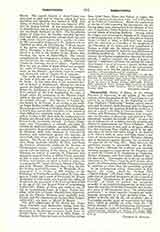

Verecundus, Bishop of Junca, in the African Province of Byzacena, in the middle of the sixth century, when the question of the Three Chapters was raised; d. at Chalcedon, in the beginning of 55.2. Pope Vigilius‘s “Judicatum” having excited almost universal discontent, both the pope and the Emperor Justinian agreed the question should be settled in a general council to be held at Constantinople. Verecundus, with Primasius of Hadrumeta, went to represent the Province of Byzacena, and arrived at Constantinople towards the middle of 551. At once the Greek bishops set out to induce them by promises and threats to anathematize the Three Chapters. Both resisted strenuously at first, and, in the grave difficulties then besetting Pope Vigilius, stood by his side; and when the latter had taken refuge in the Basilica of St. Peter’s, both, in union with him, issued a sentence of excommunication against Theodore Askidas and of deposition against Mennas, the patriarch of the imperial city (August 17, 551). Soon, however, the conditions became so unbearable that on December 23 Pope Vigilius, although his residence was carefully watched, managed to escape across the Bosporus and to reach the Church of St. Euphemia at Chalcedon. Thither Primasius and Verecundus followed him a few days later. Verecundus, up to the end an ardent champion of the Three Chapters, died shortly afterwards. After Verecundus’s death, Primasius was moved by ambition to relent from his unyielding attitude.
As an ecclesiastical writer, Verecundus is little known. His works, edited by Cardinal Pitra (“Spicil. Solesm.”, IV, Paris, 1858), consist first of a collection of historical documents on the Council of Chalcedon, “Excerptiones de gestis Chalcedonensis Concilii”, of which we possess two recensions; secondly, of an exegetical commentary in nine books upon the Canticles of the Old Testament; and thirdly, of a poem of 212 hexameter lines, “De satisfactione poenitentiae”, in which exquisite thoughts are unfortunately presented in a very incorrect form. St. Isidore of Seville (De vir. ill., vii) attributes also to Verecundus another poem on resurrection and judgment, which is possibly no other than the “De iudicio Domini” or “De resurrectione mortuorum”, found among the works of Tertullian and St. Cyprian.
CHARLES L. SOLVAY

